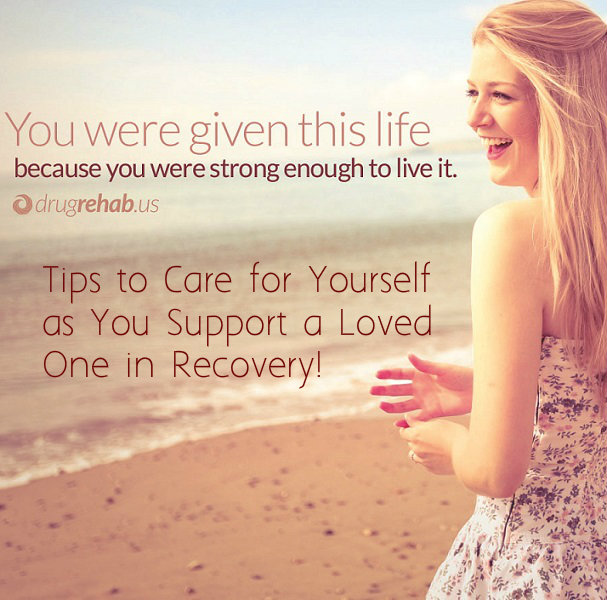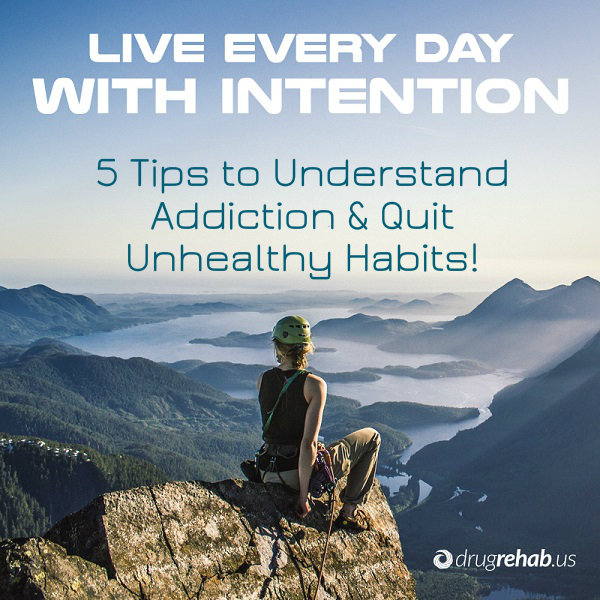When you have a loved one battling addiction, especially if it is someone close to you, it is all too easy to get wrapped up in his problems and his needs. As you support him, stand by him and care for him, don’t forget to take care of yourself. Caretakers often lose sight of who they are and become stressed, overwhelmed and sometimes even physically ill from the strain of caring for someone else. Take time for your own needs while still supporting your loved one and you will stay healthy and sane and better able to care for him.
Tips For Caring For Yourself As You Support A Loved One In Recovery
Lending Support In Recovery – Make A Plan
What does healthy support look like? If you have never stood by someone through such a difficult period of healing and transition, and if you have never watched while someone else played the role of caregiver and supporter, you may not know what is appropriate. What works for you and for your loved one is up to the two of you to decide. You need to decide if you should be living with this person, how much time you will spend with him and what form your support will take.
If, for example, you are caring for a child in recovery, you might want to stay with him until he is well enough to be independent. On the other hand, if you are supporting a friend, living together may not be an option. Instead, you may visit her every day, drive her to support group meetings or be on call as needed. Devoting all of your free time to supporting someone you care about is not necessarily feasible or appropriate. Set limitations and decide how much you are able to give.
Prepare A Support System For You
There are support groups for loved ones of addicts for a reason. Helping someone who is battling addiction, even if that person is getting professional help at the same time, isn’t easy. Knowing how tough this may be, get your own support system together. Let some of your friends or family members know what is going on in your life and that you may need to talk over a cup of coffee. Also consider picking up meeting schedules for support groups. Talking with people who have been where you are can be powerful.
Get Others To Assist
It may be that your loved one has few other people to whom he can turn for support. He may be relying solely on you. Ideally, though, you can call on others to fill in when you can’t be there. Ask trustworthy people who also care about him to spend at least a little time with him. Even just an hour here and there can be a great relief to you.
Take Time Off And Take Care Of Yourself
You can’t be there for your loved one 24 hours a day, seven days a week. It’s not practical and it isn’t good for you. When you feel overwhelmed, take a break. Whether this means taking a walk outside for an hour, spending a day pampering yourself or taking a quick weekend trip to relax and de-stress, do it. Get plenty of sleep each night, eat well, make time for exercise and fun and take time away from your duties. No one can be there for a recovering addict all of the time. If you take care of yourself, you will be better able to help the one you love overcome his struggle.
Discover Why You Should Join A Support Group As The Loved One Of An Addict – You Need Help And Healing Too!
Addictions come in many forms, ranging from the more obvious examples such as heroin or cocaine addiction right through to more subtle forms such as food, sex or social media addiction.
Although they might seem like distinct issues, they’re all described by the word addiction because they share many similarities, and they can all be helped in the same basic way. Writing in the U.K. newspaper The Telegraph, therapist David Smallwood shares five tips for understanding addiction and overcoming unhealthy habits.
Tips For Understanding Addiction And Quitting Unhealthy Habits
1. Determine Your Vice
The fact that not all addictions conform to the stereotypical image of persistent drug or alcohol abuse means it’s not as easy as you may think to work out whether you have an addiction or what the subject of it is. Remember that more socially acceptable activities, such as drinking cup after cup of coffee, working 12-hour days, going to the gym every day and eating sugar or fat-laden foods can also be the subjects of addictions. Smallwood suggests that asking a friend to critique your lifestyle may reveal some issues you aren’t aware of, even if it isn’t always a pleasant experience.
2. Learn And Avoid Your Triggers
Compulsive behaviors are a core feature of addiction, and these compulsions are brought on by internal and external “triggers.” These are feelings or situations that lead you to crave your substance or activity of choice, such as loneliness, anger, exhaustion, stress, depression or hunger. Once you identify the factors that are most crucial in creating your cravings, the goal is to break the link between the triggers and the resulting behavior. For example, if you feel stressed or irritable, you should consider calling a friend or family member, taking deep breaths, having a warm drink or taking a calming walk. Smallwood emphasizes the importance of breakfast; if you skip it, mounting hunger cravings throughout the day may be misconstrued as cravings for your substance or activity of choice.
3. Practice Mindfulness And Stay In The Moment
The basic premise of mindfulness—staying “in the moment”—is a useful tip for managing anxieties associated with attempting to remain abstinent. The goal is to focus on the now rather than getting caught up in the past or future; in Smallwood’s words, “Focus on what you are doing, rather than what you are not doing.” Take a walk and focus on the sensory information you’re absorbing; pay attention to the vibrant colors and silky textures of flower petals or the chirping of courting birds rather than being lost in regrets from the past or fears about the future. Practice meditation to improve this skill: simply sitting for 20 minutes or so and trying to focus on one thing (such as your breathing) can help empty your thoughts and bring about mindfulness.
4. Tackle The Underlying Problem
One common problem you may encounter when trying to overcome addiction is “cross addiction.” You might quit smoking, for example, only to “fill the gap” by overworking or overeating. In reality, the real cause of addiction is something deeply rooted, not the specific substance or behavior. If you switch from smoking or drug abuse to overeating, you’re just swapping one addiction for another. Smallwood jokingly compares this to swapping deck chairs on the Titanic; it’s not exactly the same situation, but you’re still heading for trouble on the same boat. Identify the root cause of your addiction (addiction treatment professionals are invaluable in this area) and work on overcoming it, rather than allowing it to manifest in a new way.
5. Set Goals
If you’ve resolved to overcome addiction, it’s important to establish what you’re trying to achieve. Setting definite goals gives you something to work toward, and later down the line, it can help you appreciate how far you’ve come. Smallwood suggests choosing a point of time—two months in the future, two years in the future, whenever suits you—and writing yourself a letter detailing your current lifestyle and how you’d like it to have changed at your chosen date. Put it in an envelope and keep it somewhere prominent and noticeable, with your chosen date written on it. The closed envelope will serve as a reminder of your goals, and when the date arrives, you can read the letter and see if you’ve been successful in your intentions. Taking a step back and examining your lifestyle like this can give you the motivation to keep working to improve yourself and your life.
You DO Have What It Takes To Overcome Addiction!
Beating addiction isn’t easy. It’s a fiendish enemy that can hide in the shadows, change appearances like a chameleon and come back into the fray when you least expect it. But that doesn’t mean you can’t do it, and with the right support and a positive mindset, you do have what it takes to make a change in your life. These five tips don’t cover every aspect of the issue, but they provide a useful, at-a-glance run-through of the core steps in overcoming addiction. If you keep these lessons in mind and work to implement them in your life, you’ll soon be on your way to regaining control and getting your life back on track.
Inspirational Recovery Posts – Be Informed & Inspired!
25 Dec 2014
How To Cope With Protracted Withdrawal
You’ve been through rehab and counseling for your addiction. You went through the terrible symptoms of acute withdrawal during detox when you thought you would never get relief. You are in recovery now, attending support group meetings and trying to carry on with your life. You were sure that by this point in your sobriety you would be feeling better, like a whole new person.
Unfortunately, you feel terrible. You could be going through protracted withdrawal, the persistence of withdrawal symptoms after they should have cleared. Instead of giving in to the urge to use in order to find relief, work through these symptoms and stay sober.
Protracted Withdrawal
What you experience during detox is acute withdrawal. Your body reacts to the elimination of the drug or alcohol and leaves you with intense cravings and other awful symptoms. Many addicts give in during this phase, especially if they have no support to get through it. Once you have completed detox, you probably thought those feelings and symptoms were over. If they persist at a lower intensity, you could be experiencing protracted withdrawal.
Symptoms Of Protracted Withdrawal
 Symptoms of this condition have been seen with opioids, methamphetamine, marijuana, benzodiazepines and cocaine and include:
Symptoms of this condition have been seen with opioids, methamphetamine, marijuana, benzodiazepines and cocaine and include:
- Insomnia
- Depression
- Fatigue
- Anxiety
- Cravings
- Difficulty concentrating
- Memory difficulties
- Irritability
- Loss of sex drive
- Unexplained physical pains
How an addict experiences protracted withdrawal is unique, but these are some of the possible symptoms that have been recorded. You may be feeling any of these or just feeling generally bad and down.
Tips On How To Cope With Protracted Withdrawal
Talk To Your Doctor
If you still aren’t feeling well long after detox, talk to your doctor and any other health professionals with whom you are working. Your doctor can go over your symptoms and eliminate any other possible health problems that could be causing your symptoms. If your health team determines that you are going through protracted withdrawal, there are things you can do to speed up your healing process and help you get through the struggle without giving in to a relapse.
Understand It Will Not Last Forever
First and foremost, understand that it will not last forever. It may seem like it now, but protracted withdrawal will ultimately end. To assure yourself of this, read up on the subject and talk to your doctor and therapist about your concerns. If any of your symptoms are related to mental health issues, such as depression or anxiety, seek professional help. Work with your therapist or a new specialist to target these particular problems. Your doctor may also be able to prescribe medications to help. It may seem counterintuitive for an addict, but there are new developments in drugs that can help opioid and alcohol addicts in particular.
Partake In Healthy Habits
Train yourself to engage in healthy habits. Being healthy will help you feel better even as your withdrawal symptoms persist. Anything you can do to improve your physical health will help. This means getting enough sleep every night, eating a nutritious and complete diet and getting plenty of regular exercise. Social support is helpful too, so enlist a buddy to make positive health changes with you or at least to exercise with you.
Continue Addiction Treatment And Be Patient
Finally, be sure to continue with your addiction treatment. Even if you completed a lengthy stay in rehab, you know that addiction requires follow up and regular care. Go to support group meetings and continue with regular therapy sessions. Remember to be patient. You are going through a difficult time, and you probably expected to feel better by now. You will feel better. Put in the work, stay healthy and continue your treatment.
Is It Post-Acute Withdrawal Syndrome Instead? Find Out Now!
Don’t Beat Yourself Up – Everyone Is Different And Will Recover Differently!
For Additional Help – Call Us Now!
11 Dec 2014
Coping With A Chronic Relapser
Helping a loved one overcome addiction is challenging. First you have to convince her that she has a problem, which may seem like an insurmountable obstacle. Once she is ready to admit to her addiction and get help, you have to support her as she goes through rehab. Finally, your loved one is prepared to re-enter the world as a sober person in recovery. And then she relapses, again and again and again. After lending so much support, how do you help the chronic relapser in your life?
Understanding Relapse
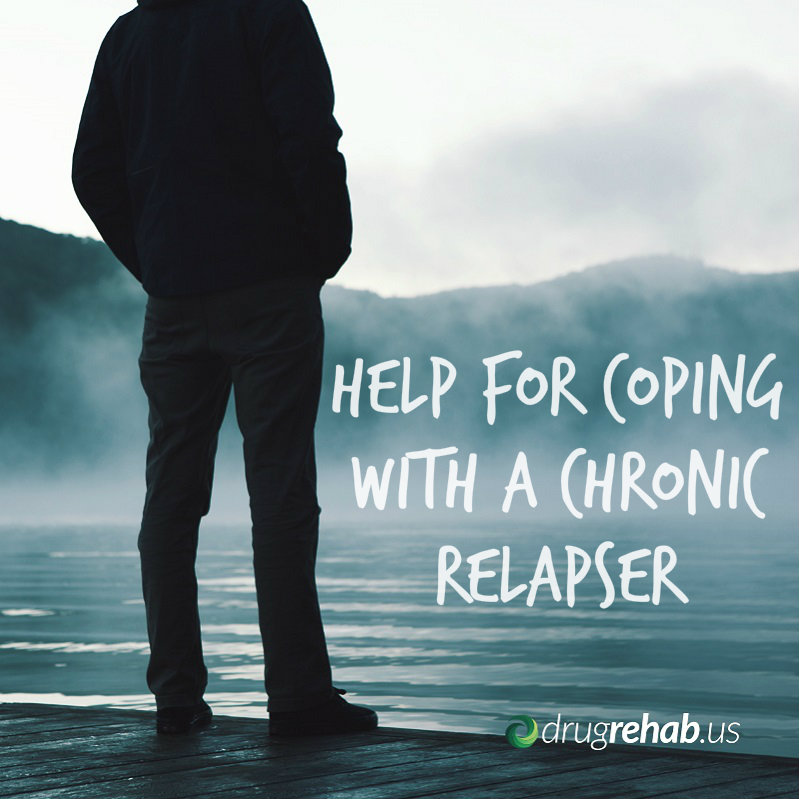 As someone who does not have an addiction or substance abuse problem, it can be difficult to appreciate what your loved one is going through. It may help you to feel better, and to be better able to help her, if you educate yourself about this disease. The old-fashioned idea about addiction is that the addict always has a choice and that if she fails at being sober, she is weak-willed and inferior.
As someone who does not have an addiction or substance abuse problem, it can be difficult to appreciate what your loved one is going through. It may help you to feel better, and to be better able to help her, if you educate yourself about this disease. The old-fashioned idea about addiction is that the addict always has a choice and that if she fails at being sober, she is weak-willed and inferior.
Research over the last couple of decades has changed that long-standing view of addiction. We now know that it is a chronic illness and has much in common with other chronic medical conditions like diabetes or arthritis. The most important characteristic of chronic illnesses that you must understand is relapse. Relapse is common and almost inevitable in all chronic diseases. These illnesses require lifelong treatment, and even then relapse may still occur.
Continuing Support Toward Your Loved One Who Is Relapsing
Knowing more about addiction and its chronic nature may help you to be more compassionate toward your loved one who is relapsing. Even so, it can be frustrating to see her repeatedly go back to substance abuse. You have a choice as to whether you continue to support her or not. Most addiction experts would urge you to continue to be there for her. Many addicts require several tries at rehab and focused treatment before relapses stop or become less frequent.
If you have the means to keep supporting your loved one, do so. She needs you. Help her in any way possible. That may mean helping her to pay for treatment, helping her to find new treatment programs that are more successful for her, or giving her a supportive place to stay after rehab. Just remember to take care of yourself as well. Don’t give more than you can afford to, financially, emotionally or otherwise. And make sure you are not enabling by making excuses for your loved one or providing financial help for their habit.
Walking Away From A Chronic Relapser
Your other option when coping with a chronically relapsing loved one is to walk away and withdraw your support. It seems like a harsh option, but there are some valid reasons to make this choice. If you feel completely drained, worn out or used up from helping her, you may need hiatus. Take a few weeks to heal yourself and tell her that you will support her once again, but that you need a break.
Another reason you may need to walk away, and maybe do so for good, is if your loved one is taking advantage of you and causing you harm. Maybe she is stealing from you. She might be verbally or physically abusive, or perhaps puts you or your children at risk by bringing drugs and dangerous people to your home. How you choose to cope with a loved one who can’t seem to stay sober is personal. Consider your options and make the choice that is best for you and your family. There is only so much one person can give.
Women And Men Have Unique Needs When Coping With Relapse. Check Out These Beneficial Tips To Cope With Relapse As A Woman – You Are Not Alone!
In June of 2014, the Delaware News Journal partnered with Christiana Care to host a forum on the heroin crisis gripping the state, but several questions from audience members were left unanswered. Panelists at the event willing to work with the Delaware News Journal have offered to answer some of these questions in an ongoing feature, and Don Keister, co-founder of the anti-addiction group atTAck and whose son died of heroin addiction in 2012, has stepped forward for the task. The question he answered revolved around what you should do when an adult child who lives with you—and has children of his or her own—is struggling with addiction but won’t get help, and his response offers important advice to anybody suffering similar issues.
The Three Cs For Family Members Of Addicts
Keister offers a core piece of advice from Al-Anon: remember the three Cs.
You didn’t cause it,
you can’t control it
and you can’t cure it.
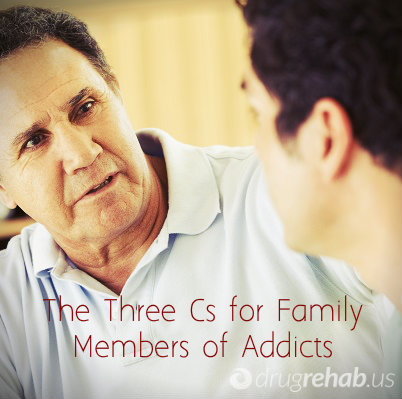 If someone you care about is suffering from addiction, there’s an inclination to try to take too much on your shoulders or even to feel guilt, but this is unhealthy.
If someone you care about is suffering from addiction, there’s an inclination to try to take too much on your shoulders or even to feel guilt, but this is unhealthy.
You’re in no way responsible for what is happening. It’s only natural to want to fix the problem for your child, but addiction isn’t like a scraped knee or a period of minor financial trouble: it’s not something you can rectify for them.
By trying, all you’ll do is make yourself more stressed and unhappy. It may seem puzzling given the situation, but you need to care for yourself as well as your family member.
That’s the real purpose of the three Cs: you need to truly understand that you aren’t to blame, and you can’t heap all the responsibility onto your own shoulders.
No Single Solution To Recovery
Sadly, there isn’t a single road you must follow to recovery. You need to think about what works for you and your family as individuals, but it is important that you’re there to offer support. You need to continue to love your child, and of course the same goes for your grandchildren.
Although you can’t force somebody to get help, you should do whatever you can to support and encourage your son or daughter to go into recovery. Even if your child won’t get help, you shouldn’t blame him or her for the issue either; addiction has many causes and it isn’t productive to become angry with or resentful of somebody struggling with it. Your child always needs to know you’re acting out of love and concern for his well-being.
Addiction As A Family Disease
Keeping all of that in mind, it’s important you recognize that addiction is a disease that affects entire families. The most obvious affected parties are your grandchildren: your son or daughter is unlikely to be capable of offering the level of parental care they need, and this is one area where your support is invaluable.
However, as the three Cs point out, you need to care for yourself too. The challenge is staying as healthy as you can while still being there to help the entire family unit—including the addict—get through this together. This is especially important if you’re all living together, but it makes it all the more difficult to avoid taking too much responsibility yourself.
Importance Of Getting Additional Recovery Support
That’s why getting additional recovery support is essential. Even if the addicted individual won’t get help, groups like Al-Anon exist to offer support to the loved ones of addicts, and can help you get through the problems you’re facing. Addiction isn’t easy for anybody in the family, and if you’re having difficulty, help is available.
Keister’s advice might not have been what you were hoping for, but it’s realistic, and attests to his personal experience with the problem. As much as you may want an easy fix, it doesn’t really exist. Things can and hopefully will get better, but until then, all you can do is be as supportive as possible and make sure you look after yourself, too.
If You Need Help With A Family Member’s Addiction – Call Us Now!
01 Dec 2014
Don’t Skimp On Your Time In Rehab
Getting treatment for drug addiction is the only way to heal from this terrible disease. If you or a loved one is struggling with drug abuse, treatment guided by caring professionals is essential.
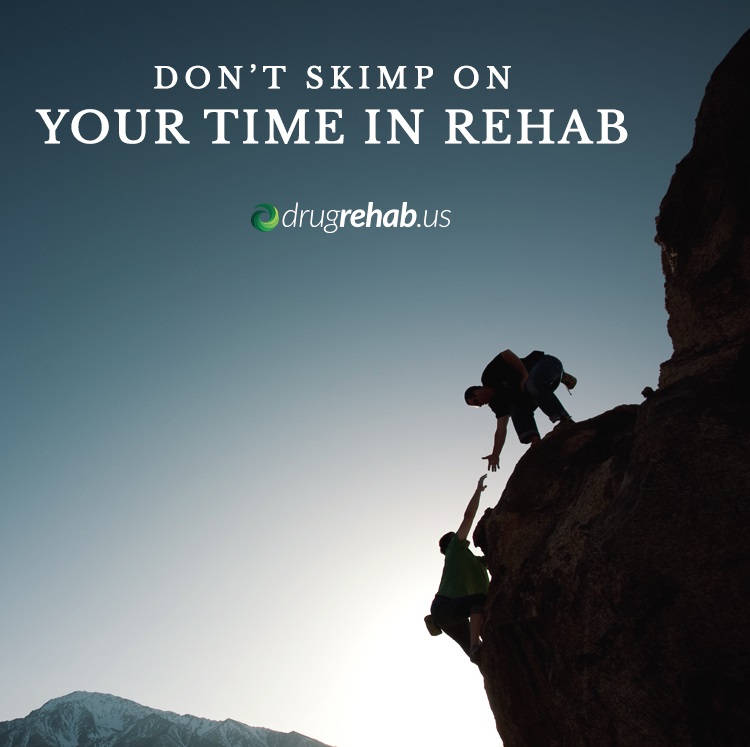 It is also important to understand that the disease of addiction is chronic. Like other chronic diseases, high blood pressure and diabetes for instance, addiction needs continuous treatment over a lifetime. You can never be cured of your addiction, but you can learn to manage it.
It is also important to understand that the disease of addiction is chronic. Like other chronic diseases, high blood pressure and diabetes for instance, addiction needs continuous treatment over a lifetime. You can never be cured of your addiction, but you can learn to manage it.
If you are thinking of going to rehab, know that the time you spend there will set you on your path to lifelong sobriety. It is important to spend enough time during this initial phase of treatment learning how to live a sober life.
Whatever you do, don’t skimp on your time spent in a good and caring rehab facility. Research shows that the best outcomes result from at least 90 days spent in residential or intensive outpatient care.
Why You Should Consider A Long Stint In Rehab
Here are several reasons you should consider a long stint in a good rehab in order to heal:
- Get past detox – Detox, that time when drugs leave your system and you get beyond withdrawal, can last longer than you think. Detox is important, but by the time it’s done, you may find you have limited time to work on actual treatment if your stay in rehab is only 30 days. Going through detox is hard, but it isn’t the part of rehab that helps you learn to be sober.
- Learn new habits –Your addiction is a habit. Your brain has learned a habit of regular drug use. In order to change those habits and learn new ones, you need time. You are going to rehab to learn how to have an entirely new lifestyle. You must take your time on this or your new healthy habits will not take root.
- Heal your brain – Your drug use has caused actual changes in your brain. It is possible to reverse those changes, but it takes time. Research has shown that in brain scans of patients receiving treatment, positive changes are still occurring up to three months after starting treatment.
- Work on relationships – The main goal of rehab is to heal and to overcome your addiction, but there are many other things to work on if you have the time. Your addiction has probably wrecked several of your relationships, for instance. If you spend enough time in rehab, you can work on repairing those.
- Treat mental disorders – Many people who struggle with addiction are also battling mental illness, whether they know it or not. Spending enough time in rehab will give your treatment professionals a chance to diagnose and treat any co-occurring disorders. When you recognize and treat mental illness you have a better chance at being successful at sobriety and living a more enjoyable life.
- Step down treatment – If you can afford the time to do so, your rehab should be followed by a step down in care. This means going from residential rehab to a sober living house or to intensive outpatient care. Doing so allows you to begin to practice your new habits and skills while still having the support and treatment of caring professionals. Going cold turkey from rehab to real life can be a shock and may lead to relapse.
Long-Term Rehab For Life-Long Sobriety
Rehab is an important step toward becoming sober and you should not skimp on it. If you are able to take the time away from work and family, spend as much time in rehab and step down treatments as necessary to help you be successful in your new, sober lifestyle.
Discover How To Choose The Right Drug Rehab For Yourself Or Your Loved One!
Many of us have long known that time spent in the great outdoors is restorative and healing. Studies are now proving that there are powerful mental, emotional and physical health benefits to spending time outside and being immersed in nature.
If you are recovering from a drug or alcohol addiction, add outdoor time to your to-do list. Camping, hiking or even just a stroll in a city park will do amazing things for you and, when you feel better, you strengthen your sobriety.
The Benefits Of Being In Nature For Recovery

Make a change and get outside more often. Doing so will give you numerous health benefits. It will help you stay sober as you find new meaning and satisfaction in your life.
Being outdoors means being more active. When you are more active you will be physically healthier. You will be stronger and may even lose weight. When you feel better you will be less likely to give in to urges to relapse. Perhaps even more important to your long-term sobriety are the mental health benefits of the great outdoors. Research has found that walking outside regularly can reduce the severity of depression. Being in nature also reduces feelings of stress, anger and anxiety; it drops blood pressure and helps improve memory and focus.
How To Add More Nature To Your Life
Spending more time in nature could be as simple as sitting outside in your backyard in the evening or going for a walk around your neighborhood instead of watching television. Here are some other easy ways you can get back to nature:
- Go for a walk – Going for a walk will give you the dual benefits of being in nature and getting exercise. If you can, find a place to walk that is as removed from human development as possible. A state or national park is a good choice, but if you can’t get to one, a city park works. Even just a walk around your neighborhood can be helpful.
- Start a backyard garden – Work on your yard or garden to get back to nature. Just weeding a flowerbed in the yard can be restorative, but you can aim bigger too. Try starting a vegetable garden. It will require regular maintenance and will get you outside often. As an added bonus, you’ll have plenty of fresh, organic produce.
- Enjoy the view – Research suggests that just looking at a nice, peaceful and natural view can be enough to give you positive health benefits. If you are not in a position to exercise or go for a walk, find a nice park bench with a pretty view and take it in.
- Take kids to the park – If you have kids, turn of their devices and take them out to play. This will benefit both you and the kids. You will all reap the rewards of spending time outside, getting exercise and, best of all, spending quality time together.
Nature is a powerful force for good and too many of us have become disconnected from it. As a recovering addict you stand to benefit immensely from spending time in the great outdoors. Replace a few of your TV shows or some of your smartphone time with a trip outside. You won’t regret it.
Learn More About Interesting And Unique Types Of Alternative Drug Treatment Programs!
04 Nov 2014
The Danger Of Addiction Stigma
Addiction is one of the most stigmatized diseases there is. Stigma refers to a sense of disgrace or shame attached to an action, behavior or situation. Many people still view addiction as a choice or evidence of weak moral character, and therefore as something shameful. Even as research and scientific evidence point to the medical characteristics of addiction and the chemical brain changes that occur in addicts, we still stigmatize addiction. If you or someone you know has battled addiction you know how overwhelming that stigma can be. It can also be dangerous and it needs to be shattered.
Stigma Prevents Addicts From Getting Help
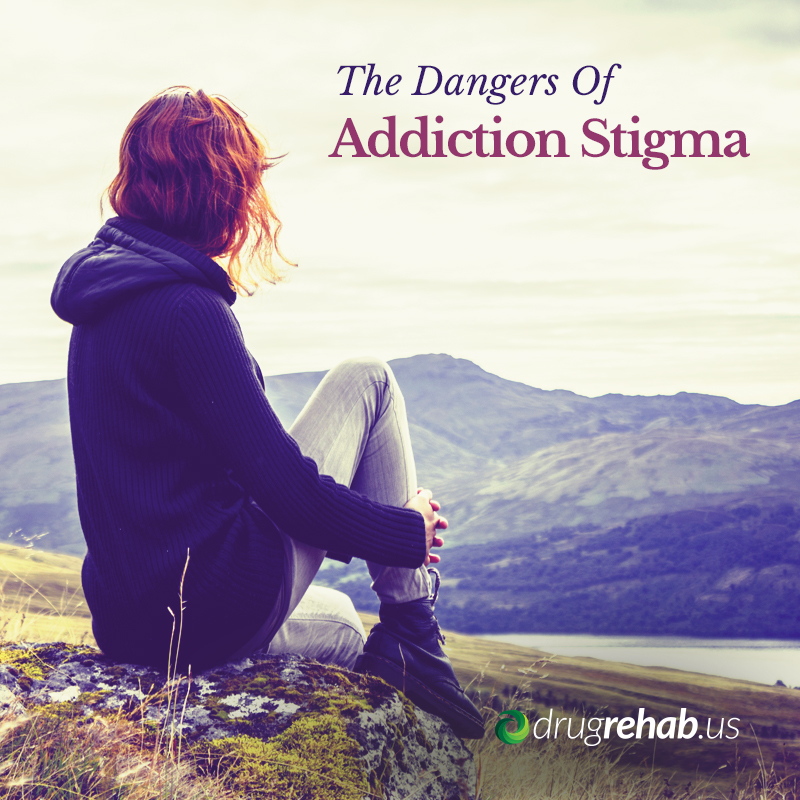 Perhaps one of the biggest dangers of stigma is that it keeps addicts from getting the professional help they so desperately need. When society at large views addiction as a moral failing rather than a medical illness, it makes sense that addicts would not want to admit to having a problem with substance abuse.
Perhaps one of the biggest dangers of stigma is that it keeps addicts from getting the professional help they so desperately need. When society at large views addiction as a moral failing rather than a medical illness, it makes sense that addicts would not want to admit to having a problem with substance abuse.
Why admit to something that would make everyone around you think less of you? It hurts to think of being treated that way, but it happens. And for this reason, many addicts deny their problem, hide their habit and refuse to get life-saving help, sometimes until it is too late.
Addiction Treatment Lags Behind Modern Medicine
Another danger of the stigma of addiction sits squarely in the world of medicine and the way in which the disease is treated. In spite of new research that shows the truth about addiction and which keeps growing in scope, treatment lags behind. We now know that addiction is a disease of the brain and should be treated as such. And yet, the majority of addicts in treatment are not getting care that is based on evidence and research. Just a small portion of addicts gets treatment that reflects what we know about addiction. Only when stigma shifts will treatment begin to change.
Addicts Are Going To Jail
The stigma of addiction is also entrenched in the justice system. Many addicts end up in jail for minor drug crimes, such as possession, when they really belong in treatment facilities. Most of the crimes committed by addicts are in the pursuit of drugs; in other words, their actions are a part of the disease. Sending an addict to jail for possession is almost akin to jailing someone with cavities for eating sugary foods or an obese person for having junk food. The latter two may sound ridiculous, but if we remove the stigma from addiction and view it as a disease, sending an addict to jail for having heroin would also sound outrageous.
Shattering Stigma
Stigma is dangerous. It prevents addicts from getting treatment, subjects addicts to sub-standard and ineffective treatment, and puts addicts in jail. If the incidence of addiction is to be reduced, we need to reduce stigma. If you or someone you know is an addict, it’s time to speak out and get help. We can work to end stigma by refusing to be quiet or complacent about addiction. Don’t deny the problem. Actively seek help and evidence-based treatment. Talk about your addiction and make sure people listen.
There is nothing shameful about having a disease and it’s time that everyone recognizes that fact. Stigma is killing addicts and that is the real shame when it comes to addiction. Change is coming, as evidenced by work of researchers and advocates for addicts, and it can’t come soon enough.
Time To Get Started And Take Action – Take That First Step To Addiction Recovery – Call Us Now!


